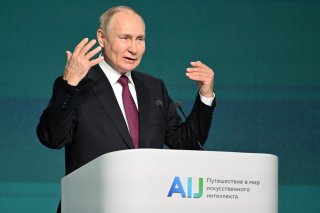Information Warfare Can Turn Russians Against Putin
It is time the West make use of information warfare’s full potential to split Vladimir Putin from his supporters.
Conclusion
The essential problem is that authoritarian regimes guard access to their populations because they depend on propaganda, coercion, and creating a collective action problem for their political opposition. While any Western campaign of information warfare might not be decisive in bringing about a positive outcome in Ukraine, it might be critical in that it manipulates public sentiment more cheaply than any other instrument. If the campaign produces any effect, Russia may feel compelled to retaliate kinetically against the West if it believes domestic agitation is being instigated from abroad. Coming between a dictator and their audience will be highly provocative to a nuclear-armed autocracy and require vigilant Western deterrence. Russia and China have already engaged in targeted social media campaigns and the dissemination of disinformation, in particular against Georgia, Ukraine, the United States, France, Germany, the Czech Republic, and more. The scale of this threat may lead them to align critical aspects of their disinformation operations.
Western liberalism is the world’s new revolutionary movement, casting aside both traditional and authoritarian regimes in countries with emerging middle classes. So far, Western governments have recognized this critical weakness in Russia, China, North Korea, and Iran, and have withheld their equivalent of a nuclear option—which is active information warfare—to disrupt these societies’ confidence in their leaders. Both Russia and China are vulnerable to the fact that a segment of their populations born in the post-Cold War era have modern sentiments which are averse to authoritarianism, traditional religion, and war, while being adept at exploiting the modern information-based economy and paradoxically providing the fighting-age soldiery for the military.
Dr. Julian Spencer-Churchill is associate professor of international relations at Concordia University, and author of Militarization and War (2007) and of Strategic Nuclear Sharing (2014). He has published extensively on Pakistan security issues and arms control, and completed research contracts at the Office of Treaty Verification at the Office of the Secretary of the Navy, and the then Ballistic Missile Defense Office (BMDO). He has also conducted fieldwork in Bangladesh, India, Indonesia and Egypt, and is a consultant. He is a former Operations Officer, 3 Field Engineer Regiment, from the latter end of the Cold War to shortly after 9/11.
Touraj Riazi has previously advised Ontario’s President of the Treasury Board, Minister Responsible for Digital and Data Transformation, Minister of Finance, and was a manager for Ontario's first Minister Responsible for Digital Government. He specializes in the technologies of digital transformation, cyber security, artificial intelligence, defence, and global economics.
Image: Reuters.

